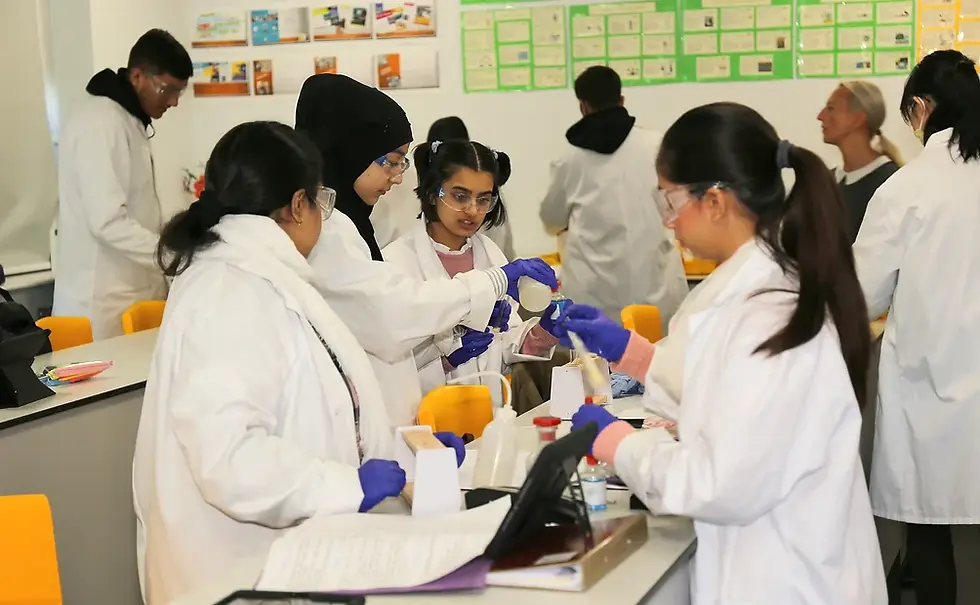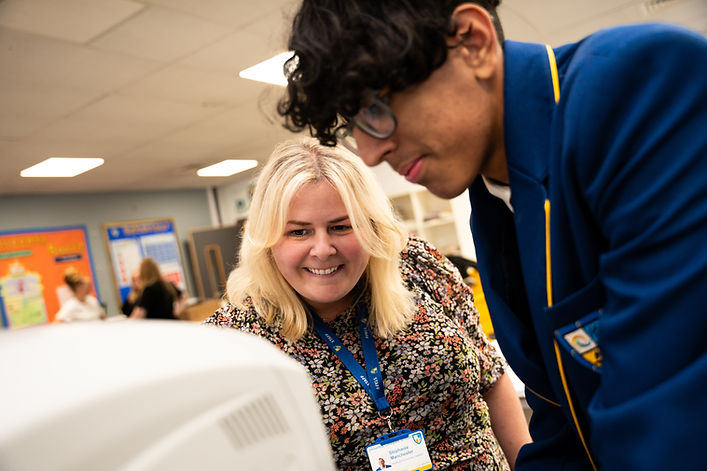
Physics
Curriculum Overview
The curriculum in science has been carefully mapped to include full National Curriculum coverage for the three strands of science at key stage 3. As a core subject GCSE science is studied in years 10 and 11 by all pupils, through either the combined science (Trilogy AQA) route or via an optional separate science GCSEs of Biology, Chemistry and Physics (AQA). Predominantly paper 1 topics for each strand are delivered in year 10, and paper 2 topics in year 11.
The science curriculum contributes to the development of transferrable skills such as mathematical skills, problem solving, analysis and evaluation especially through the practical elements of the course such as Working Scientifically.
Pupils achieve well in science, and through the links between KS3 and KS4 we continue to challenge all pupils to make the best progress possible, especially those who have achieved highly in previous key stages.
As we offer several options for further study of science at UCS our goal is to prepare pupils for the next phase of their studies, with many going on to complete either vocational qualifications or science A-levels. For those that do not have science explicitly in their future it is our goal that they are prepared to critically assess information that comes their way through the media and social media.

Teaching Physics
"Quality First Teaching" underpins our approach, ensuring lessons are engaging, inclusive, and tailored to foster deep understanding across all key stages.
Pedagogy
Lessons are planned using the 5Ps (Prepare, Propose, Present, Practice, Plenary) and often contain Kagan structures and TLaC strategies. Lessons are adapted for each group by the teacher to ensure that they are appropriate for the class that is receiving the lesson. Lessons are structured to provide scaffolding for all pupils to help build understanding of complex scientific ideas.
The specialists in the department provide training for non-specialists on explanations and teaching strategies that aim to develop expertise across the department, avoid misconceptions and ensure that definitions and teaching are consistent across the department regardless of the teacher.
All lessons in science begin with a ‘Do now’ task, these can be a variety of activities designed to get pupils thinking about science. These are most often recall activities such as ‘starter for 10’, ‘retrieval roulette’ or ‘fish, dog elephant’. All of these promote recall and retrieval and are an opportunity for interleaving. This frequent, low stakes retrieval practice encourages revision of content and allows misconceptions to be identified and definitions of tier 2 and 3 vocabulary and equations to be practiced.
UTC Fingerprint

The science department teach scientific thinking and methods that are applicable to many areas of everyday life. This has been relevant during the last few years when understanding the science in the news has been of paramount importance.
We enthuse our pupils through engagement with museums and universities. For example, our A-level cohort have been able to attend an Access All Areas Day at the dental department of The University of Bolton. We have also been lucky enough to have a week-long experience in school for KS3 and 4 that included the opportunity for pupils to handle ancient meteorites, rocks brought back from the Moon by the Apollo missions and other rocks that would normally be behind glass in a museum. We have also had visits from Medical Mavericks and Wonderstruck which wile being crossover events with Health and Engineering are also relevant to science career paths.
We are working with employers such as CAT who we partnered with to launch an infrared camera into the stratosphere with some of our year 12 students, and TLX Insulation with whom we have a year 10 project planned. These projects bring some different experiences and some insight into working beyond school for all our pupils. This is becoming embedded into the curriculum across the school as we make more industry and university links.






